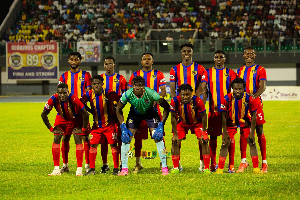With a record of consistent growth, Ghana has been touted as one of Africa's economic successes. But prosperity has eluded most Ghanaians, and with the approach of elections scheduled for 1996 they appear to be growing increasingly impatient with President Jerry Rawlings and his 13-year rule.
Since late April, nurses, teachers, and civil servants have demonstrated almost daily over the economic hardship caused by the introduction two months ago of a 17.5 percent valued-added tax. The tax is supposed to fall most heavily on purchasers of luxury goods, and food was exempted entirely. But merchants have used the tax as an excuse to raise food prices by as much as 300 percent.
Protesting civil servants demanding a 70 percent pay increase shut down the Ministry of Finance last week. Then on May 11, 5 people were killed and 17 injured when a pro- government mob clashed with a crowd of about 10,000 marching on Accra's large central market.
Thursday's protest marked the first time the opposition parties, and not the unions, organized a march. In its aftermath, people expressed shock not only at the violence, but also at the sheer numbers the opposition was able to mobilize.
Ghanaians have shown relatively little interest in other potentially volatile issues. When the government shut down the country's first independent radio station in December, only about 500 people turned out for a march to present a petition to Parliament. When the minister of finance announced in January a 25 percent rise in gasoline prices, there was widespread grumbling but little more. But for many, the tax was the last straw.
"When we don't react to certain things, people think we just never react," said Smart Chigabatia, executive- secretary of the Ghana Civil Servants Association. "We are being gentle. We are using our intelligence. And now our intelligence is pointing us one way - we will not sit down and be cheated every day."
The government is hoping to defuse the issue with legislation presented on Friday, May 19, that lowers the tax to 15 percent and exempts retailers. But as Parliament spends the rest of the month debating the bill, the marches are continuing in Accra and spreading inland to Kumasi.
The issue has galvanized the opposition, which had been struggling since the inception of constitutional rule in 1992. Coming together under the name Alliance for Change, a group of prominent opposition politicians has gleefully seized on the public's vague desire for anything different.
"President Rawlings has been built up in the international press as such a success for his implementation of IMF policies that when things like this happen, it's hard to explain," said Nana Akufo-Addo, a leader of the Alliance for Change. "The success has been very, very skin deep. We know there has been growing impoverishment of the people, and the demonstration was the first sign of that."
Undaunted by Thursday's violence, civil servants rallied on Friday in front of the Ministry of Trade and Industry. "We are protesting because we are hungry," said Kojo Dan, an accountant who was among the demonstrators. "We are not against the government. We are civil servants. We only need our salaries to be changed."
Nevertheless, in all the demonstrations of recent weeks, marchers have carried signs calling for the president and minister of finance to step down.
Addressing Friday's rally, Chigabatia said: "We are thinking about lowering inflation. We are thinking about raising investment. But we are not thinking about the people who can make this investment work."
Click to view details



Business News of Thursday, 25 May 1995
Source: --






![Deputy Minority Leader, Emmanuel Armah-Kofi Buah [L] and First Lady Rebecca Akufo-Addo Deputy Minority Leader, Emmanuel Armah-Kofi Buah [L] and First Lady Rebecca Akufo-Addo](https://cdn.ghanaweb.com/imagelib/pics/114/11465182.295.jpg)









